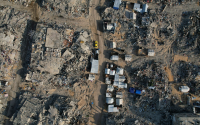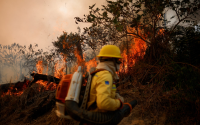 The killing of Baghdad's governor is another example of violence |
10 January 2005Paul Reynolds
The head of Iraq's intelligence service Gen Muhammad Shahwani now puts the number of insurgents at 200,000, of which 40,000 are said to be the hard core and the rest active supporters.
These figures do not represent an insurgency. They represent a war.
Despite calls for the election to be delayed from its scheduled date of 30 January, the interim Prime Minister Iyyad Allawi insisted on Wednesday that the vote should go ahead.
"The violence, terrorists and the outlaws will not be allowed to stop the political process and destroy the country," he said.
"Elections will play a big role in calming the situation and enable the next government to face the upcoming challenges in a decisive manner."
Questions
However, questions have to be asked about what happens after the election if the fighters, mainly Sunni Islamists and nationalists, continue their attacks.
If they do, they and the likely winners of the election, parties representing the majority Shia population, could come into conflict. This in turn could lead to a possible civil war.
Shia leaders have called for talks with Sunni representatives in the hope of averting such a scenario.
Nobody has as yet openly called for the withdrawal of US troops as the price of ending at least the nationalist part of the insurgency. But the idea could arise at some stage.
Matters post-30 January would be made worse if there was a low turnout in the Sunni areas because there would then be at best only a weak voice for a powerful section of Iraqi society and the one supporting the current fighting.
Calls for delay
A leading Sunni party, the Iraqi Islamic Party, is boycotting the vote. Elder statesman Adnan Pachachi has again called for a delay and a few more voices have been added to his chorus.
Defence Minister Hazem Shaalan said he had asked Egypt to approach Sunni leaders and urge them to participate.
"We want to give our Sunni brothers another chance even if this means delaying the vote," he said.
Iraq's UN ambassador Samir al-Sumaidaie had earlier proposed a delay of two or three weeks and suggested reserving some seats for the Sunnis for later selection, in an interview with the Washington Post.
The power of the insurgents was demonstrated again on Tuesday with the assassination of the governor of Baghdad Ali al-Haidri - the latest in a blistering series of attacks.
Many of these have targeted the Iraqi security forces which just do not have the ability to fight back effectively.
An example of this also came on Tuesday. A tanker loaded with explosives and driven by a suicide bomber - of whom there appears to be an unlimited supply - blew up at an Iraqi interior ministry commando headquarters in Baghdad, killing eight commandos and two civilians.
These commandos were formed as a special unit to target insurgents and to help make up for the ineffective regular police and national guard. Instead they are the target.
Loss of control
Until recently, the US military has talked of there being about 25,000 fighters in Iraq.
Gen Shahwani has not just upped the estimate, but has put it into the wider context of the active guerrilla support which perhaps gives a truer picture. There are 150,000 US troops.
Anthony Cordesman, an analyst with the Center for Strategic and International Studies in Washington commented: "The Iraqi figures do... recognise the reality that the insurgency in Iraq has broad support in Sunni areas, while the US figures downplay this to the point of denial."
Mr Cordesman has for months pointed out the weakness of the local Iraq forces, saying recently that they were basically unprepared and "sent out to die."
The level of attacks is now so intense and sophisticated that it is not surprising that the former British representative to the former Coalition Authority, Sir Jeremy Greenstock, said recently that the insurgency was "irremediable" and "ineradicable" by US and other foreign troops alone.
"It depends on the Iraqis. We have lost the primary control," he said.
Recent events indicate that Iraqis have lost the primary control as well.






